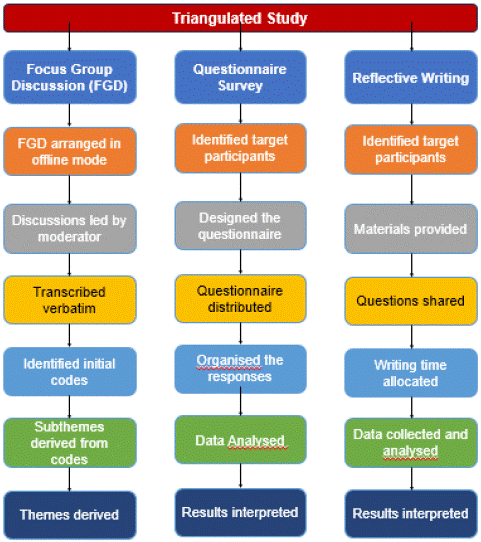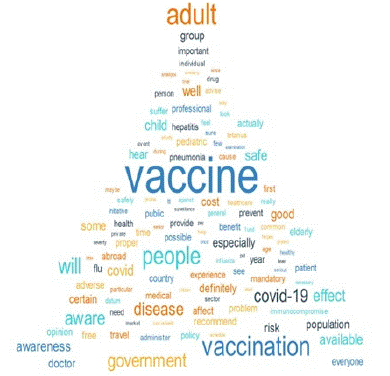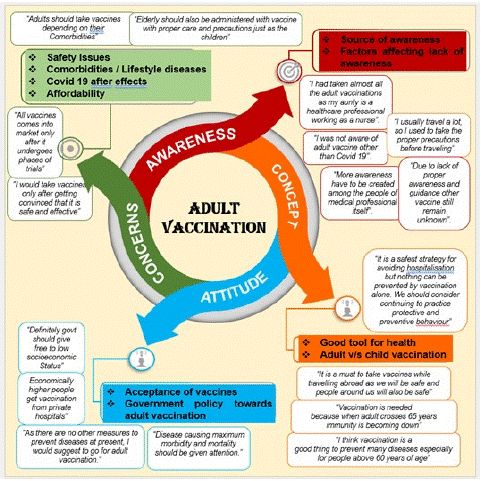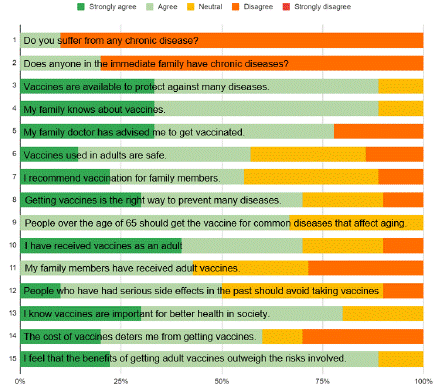Abstract
Background: Vaccination is the most effective and economical way of dealing with the diseases which can affect a large population. Adults are vulnerable to many vaccines’ preventable diseases particularly during outbreaks due to lack of immunization, waning immunity, age related factors and epidemiological shift. An adult vaccine has remained as an under-used public health strategy to promote healthy aging. It is needed to protect the most productive age group and improve the quality of life of the aging population. Hence the investigators enquired into attitude towards adult vaccination. The factors influencing need for adult vaccines was ferreted out from the data to build a necessary sensitization.
Aim: This qualitative study aims to determine the current attitude of citizens regarding adult vaccination and to determine the factors influencing adult vaccination.
Methods: This qualitative study is triangulated for robustness of the study. Focus group discussions were conducted on 3 different group consisting of 8 participants each. Participants were selected through purposive sampling. Discussions were recorded and transcribed. Questionnaire and reflective writing on adult vaccination were requested from randomly selected people from general population.
Results: There were 24 females and 22 males with a mean age of 39+/- 12. Subthemes were extracted out from the study which led to the themes. i.e. source of awareness, attitude, concepts and concerns regarding adult vaccines. Questionnaire was analysed and higher percentage showed a positive attitude towards vaccination.
Conclusion: Participants have mixed perceptions regarding adult vaccination. Creating proper awareness can tackle the various concerns related to adult vaccination.
Keywords: Adult vaccines; Qualitative; Focus group discussion
Introduction
Vaccination is the most effective and economical way to prevent diseases which can affect a large population. Vaccines have provided a more positive impact on public health globally than any other medical intervention [1]. Vaccination is required to improve herd immunity which can be achieved through catch-up coverage, protection against changing strains, protecting at-risk populations after childhood, vaccination of travellers and protection against emerging diseases. Adults are vulnerable to many vaccines’ preventable diseases particularly during outbreaks due to lack of immunization, waning immunity, age related factors and epidemiological shift. An adult vaccine is considered important for health, but still, it has remained an under-used public health strategy to promote healthy aging [2]. The popular recommended vaccines for healthy adults in India are Tdap (tetanus, diphtheria and pertussis), MMR (Mumps,measles, rubella), Influenza, Pneumoccocal vaccine, HPV (Human Papilloma Virus) and Zoster. Other vaccines which are recommended in high-risk individuals include Hepatitis A, Hepatitis B, Menningococcal, Varicella, HiB, Typhoid, Cholera, and Rabies [3]. Vaccination of children has had a major impact on the morbidity and mortality of many infectious diseases globally. Unlike adult vaccination paediatric immunization has a global program and focused substantial funding. Most developing countries do not even have vaccination policies specifically targeting adult populations [4]. Adult immunization is considered only in pregnancy, immunization of health-care workers, high-risk occupations, travel vaccines, and during pandemics. General population especially health care professionals and medical students have been recommended to take vaccines and has been suggested to take the same right from the undergraduate level. Another factor which affects adult vaccination is the public hesitancy to take vaccines due to the fear of side effects and lack of knowledge on importance of these vaccines [5].
Vaccination is needed to protect the most productive age group and improve the quality of life of the aging population [6]. It is important to know the attitude of adults towards adult vaccination as it is as important as paediatric immunization. Hence the investigators enquired into attitude towards adult vaccination. The factors influencing need for adult vaccines was ferreted out from the data to build a necessary sensitization.
Through this qualitative study we would like to understand the knowledge, attitude, and concerns regarding adult vaccines in different population groups. Better utilization of adult vaccines leads to healthier adulthood and safe ageing.
Methods
The study was carried out after seeking approval from institutional ethics committee and participants were selected after obtaining informed consent. This qualitative study was triangulated for robustness of the study (Figure 1).

Figure 1: Methodology.
Focus Group Discussion (FGD)- Focus Group Discussions were conducted on 3 different groups consisting of 8 participants each. First group included doctors from institution, second group included ladies from general population and third group consisted of gents from general population. A structured agenda was put out for group discussions which was recorded and later transcribed [7]. Word cloud was generated using trial version of MAXQDA 2022 software (Figure 2).

Figure 2: Word cloud.
Questionnaire on adult vaccines had been given to the participants on LIKERT scale to check through knowledge, attitude and practice about adult vaccines [8]. Reflective writing was requested from persons from general population that described their views/opinions on adult vaccines.
Results
Sociodemographic Characteristics
There were 24 females and 22 males with a mean age of 39+/-12. Subthemes were extracted out from the study which led to the themes i.e. source of awareness, attitude, concepts and concerns regarding adult vaccines (Figure 3). Questionnaire was analysed and higher percentage showed a positive attitude towards vaccination (Figure 4).

Figure 3: Themes, subthemes and quotes.

Figure 4: Questionnaire – results.
Discussion
This qualitative study has been conducted using multimodel approach for enhancing the validity of the study. Focus group discussions were conducted for three groups.i.e. gents, ladies and doctors. Reflective writing was requested from randomly selected ten people that included another set of ladies, gents and doctors. A questionnaire using likert scale was distributed to ten participants which also comprised of ladies, gents and doctors. This triangulation of the study makes way for a more generalisable result.
Focus Group Discussion and Reflective Writing
Doctors were most verciferous in their opinions and held out for the use of adult vaccines. But the ladies and gents’ group was justifiably agreeable to the use of adult vaccines.
Theme 1: Source of Awareness of Adult Vaccination
Source of awareness on adult vaccination was mainly from newspapers, social media and healthcare professionals. Most of them were not aware of adult vaccines in both gents and ladies group with exception of covid vaccine. These findings were similarly observed in a study done by Biyik et al and Sengupta et al respectively [9,10]. Doctors concluded with the concept of providing proper awareness programs for vaccination. In a study done by A. Monier et al, they opined that various information campaigns related to safety and benefits can improve the vaccination awareness [11].
Theme 2: Attitude Ttowards Adult Vaccines
People from all three groups were willing to take vaccines if made available. Very few from gents group were against vaccines. Almost all of the participants would prefer a government policy about vaccines for the public which reflects the strong belief and trust in the governmental consensus in health care. Our observation was similar to a study done by Ramesh et al where they highlighted the importance of government policy for vaccination and including adult vaccination in the routine adult immunisation schedule [12]. Doctors suggested that vaccines need to be supplied free of cost atleast for the immunocompromised which was also observed in a study by Mansour et al and Shoham et al [13,17]. Partnership with the private sector would reduce economic burden. A study from India suggested that adult population in the middle and low socioeconomic groups are very huge. Hence it is not feasible to offer free vaccines for all. Ladies commented about the availability of the vaccine to the rich. The unequal distribution of vaccines to poor and rich has been mentioned in a study by Huda et al [15]. Diseases can affect individuals without looking at their socioeconomic status. It is always the marginalised and underprivileged who do not get the necessary vaccines as disease can affect anyone despite their financial status. People from whom the reflective writing was requested commented that there is no other effective measure to prevent diseases. A doctor added that people accept vaccines only as a last resort when faced with uncontrollable disease outbreak and death rate.
Theme 3: Concept of Adult Vaccination
All three groups had a concept that vaccination is a good tool for health as the benefits outweighs risk. All three groups were equivocal in the concept that vaccines for travelling abroad is a must as it is a safety tool to protect themselves and people around them. Infectious diseases that commonly affect children are innocuous but when they occur in the adult age group, it can have a multitude of sequelae (eg. Guillen Barre Syndrome post varicella).
Both ladies and gents groups had a concept that vaccines are equally necessary for adults and children. Both groups had suggested that adults should also be provided with vaccines after proper health checkups.
Theme 4: Concerns Regarding Adult Vaccination
Participants of ladies and gents group were concerned about the adverse effects of vaccines especially people suffering from lifestyle diseases. Concerns about adverse effects were also mentioned in a study by Nikhita et al [5]. Ladies group commented that vaccines have to be given after proper examination of a person. The doctors were of the view that benefits which outweighs the risk of vaccination, thus underlining the use of vaccines whenever possible. They also consider assurance from healthcare professionals cajole the public into accepting vaccines. Ladies group were concerned about taking vaccination without consulting a doctor. From a study done by Biyik et al, it was pointed that doctors need to be at the forefront to reduce vaccine hesitancy and thus improve the administration of adult vaccine [9].
Some of the participants in the gents group were against vaccination as they are concerned about the complications faced due to covid vaccination. A doctor from whom reflective writing was requested added that creating proper awareness can reduce the misconception and fear among the people.
Questionnaire
Among the ten people to whom the questionnaire was distributed higher percentage had a positive attitude towards vaccination. Most of them agree that vaccine is a protective tool against many diseases and it is important for better health in the society. Most of the responders have taken adult vaccines most common being the covid vaccine. Most of the responders agree for adult vaccines when prescribed by their family physician. Majority agree that benefits of getting vaccinated outweighs the risk. Similar results were observed in a previous study by Mansour et al regarding the benefits of vaccines [14]. Almost all the participants agree that their family is aware of adult vaccines but, only, a few would recommend adult vaccines to their family members. The responders were equivocal about the safety of vaccines. Previous studies on adult vaccination shows similar results when comes to safety issues of vaccines. Responders were neutral on the topic of vaccination to be taken despite adverse reaction to previous vaccination. The cost of adult vaccines deters most of the people from getting vaccinated which was similarly expressed in a study by A K Patel et al [16].
Thus, we see that despite 3 methodologies being used, the adult vaccination is an acceptable proposition which is mandated for health and public assurance of adult vaccine usage is confirmed. This allows for charting a course of remedial interventional measures to improve adult immunization policy. As adult vaccination is relatively a new concept, this study explored the extend of awareness of adult vaccines to formulate guidelines for an ongoing adult immunization program. Our only study limitation is the qualitative methodology used. The perception is a novel ideology just beginning to percolate into the minds of doctors and general population. Our study is indeed a foundational stone for building the framework of adult immunization program implementation and its success.
Our recommendation for an immunization schedule for adults and geriatrics is, in a fertile soil, and hence will trigger, feasibility and implementational guidelines for adult vaccine use.
Conclusion
Adult vaccines have a rising prominence in medical care. The understanding of public on adult vaccines is necessary before embarking on preparation of guidelines and implementation of immunization schedule. Hence the investigators explored this hither to uncharted course using qualitative methodology to bring out various themes, subthemes and codes.
A triangulated study using 3 methods i.e. focus group discussions, reflective writing and questionnaire was conducted on the general public. It was surprising to note that the absolute belief in governmental consensus in healthcare by the general public. The public is not averse to adult vaccination, in fact, have high acceptance with a cautionary view on the safety profile of present vaccines. The foundation for adult immunization program should be incorporated at this juncture when the perception is clear and mandate for vaccination which is necessary unless individual variation preclude the use of vaccines.
References
- Kena A Swanson, H Josef Schmitt, Kathrin U Jansen, Annaliesa S Anderson. Adult vaccination, Human Vaccines & Immunotherapeutics. 2015; 11: 150 155.
- Faujdar DS, Kaushik SK, Sharma P, Yadav AK. Need to Study the Health Impact and Economics of Adult Vaccination with India in Focus. Indian J Community Med. 2022; 47: 471-475.
- Dash R, Agrawal A, Nagvekar V, Lele J, Pasquale AD, et al. Towards adult vaccination in India: a narrative literature review. Hum Vaccin Immunother. 2020; 16: 991-1001.
- Rodrigues CMC, Plotkin SA. Impact of Vaccines; Health, Economic and Social Perspectives. Front Microbiol. 2020; 11: 1526.
- Kalra N, Kalra T, Mishra S, Basu S, Bhatnagar N. Hesitancy for Adult Vaccines Among Healthcare Providers and their Family Members in Delhi, India: A Cross-Sectional Study. Dialogues Health. 2022; 1: 100044.
- Ciarambino T, Crispino P, Buono P, Giordano V, TramaU, et al. Efficacy and Safety of Vaccinations in Geriatric Patients: A Literature Review. Vaccines (Basel). 2023; 11: 1412.
- Kumari A, Ranjan P, Chopra S, Kaur D, Kaur T, et al. What Indians Think of the COVID-19 vaccine: A qualitative study comprising focus group discussions and thematic analysis. Diabetes Metab Syndr. 2021; 15: 679-682.
- Kumari A, Ranjan P, Chopra S, Kaur D, Upadhyay AD, Kaur T, et al. Development and validation of a questionnaire to assess knowledge, attitude, practices, and concerns regarding COVID-19 vaccination among the general population. Diabetes Metab Syndr. 2021; 15: 919-925.
- Biyik MV, Arslan I, Yengil Taci D. Study to increase the pneumococcal vaccination rates of individuals aged 65 years and older. Prim Health Care Res Dev. 2020; 21: e37.
- Sengupta M, Dutta S, Roy A, Chakrabarti S, Mukhopadhyay I. Knowledge, attitude and practice survey towards COVID-19 vaccination: A mediation analysis. Int J Health Plann Manage. 2022; 37: 2063-2080.
- Monier A, Puyade M, Hernanz MPG, Bouchaert P, Leleu X, Tourani JM, et al. Observational study of vaccination in cancer patients: How can vaccine coverage be improved?. Med Mal Infect. 2020; 50: 263-268.
- Verma R, Khanna P, Chawla S. Adult immunization in India: Importance and recommendations. Hum Vaccin Immunother. 2015; 11: 2180-2182.
- Shoham S, Batista C, Ben Amor Y, Ergonul O, Hassanain M, Hotez P, et al. Vaccines and therapeutics for immunocompromised patients with COVID-19. EClinicalMedicine. 2023; 59: 101965.
- Alharbi M, Alshehri A, Almawardi S, Harshan A, Abdulrahman O. Knowledge, attitude, and practice of taking the pneumonia vaccine among adults in the Kingdom of Saudi Arabia. Int J Med Dev Ctries. 2022; 6: 117–26.
- Ahmed Ali H, Hartner AM, Echeverria-Londono S, Roth J, Li X, Abbas K, et al. Correction: Vaccine equity in low and middle income countries: a systematic review and meta-analysis (International Journal for Equity in Health. 2022; 21: 82.
- Patel Anant K, Jain Prashant, Kujur Anurag, Patel A. A Study of Knowledge, Attitude and Practice Pattern of Adult Immunization. Int J Heal Clin Res. 2021; 4: 120–3.
